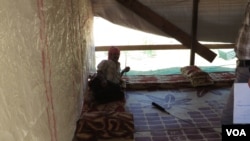BEKA'A VALLEY, LEBANON —
In the Beka'a Valley of eastern Lebanon, Syrian refugees wait out the war in sparse homes, many made of plywood and cut-up bags. There is a certain solidarity among them, but refugees say as the war drags on, political divisions are growing, even within religious groups.
A young man pours Syrian coffee into tiny porcelain cups at the home of Syrian refugee Ghazy Ali in the Beka'a Valley. Ali said he pays about $650 a year for the use of the concrete block that makes up his floor. He has put up plywood corners and connected them with walls made of sheets, old rice sacks and blankets.
He said his only real loyalty is to his home in Syria, where he wants to live in peace. He is a Sunni Muslim of the Bedouin tribe. But if he has a choice of who wins the war in Syria, he said he likes the Islamists because their priority is the Muslim faith.
Down the road from Ali's place, Mashour al-Freg and his wife Saada are elated - celebrating the release of their son, Ibrahim, from a Syrian government prison. Saada takes out a laminated ID card specially made so she could visit the prison. She smiles, saying she plans to rip it up.
Also Sunni Muslims, Mashour's family supports the Free Syrian Army, a rebel militia more commonly called 'jeish al-har' - the free army.
Mashour said he's not sure why loyalties in Syria continue to splinter. Political affiliations used to be more closely aligned with religious beliefs, he added. But after two-and-half years of civil war, many ordinary people have been killed by all sides, driving their families to support another group.
Even within religious and political groups, Syrians are divided over the threat of a U.S. air strike against the Syrian regime for an alleged chemical weapons attack that killed more than a thousand people in Damascus.
At Mashour and Saada's place, the couple said they are in favor of U.S. President Barack Obama's plan because they hope it could pave the way for a free army victory and an end to the war. Obama, however, wants limited strikes intended to deter the use of chemical weapons, not end the war or oust Syrian President Bashar al-Assad.
And as Syrian families wait for September 9, when U.S. lawmakers return to work before voting on Obama's plan, Syrians are fleeing their homes faster than ever. Aid workers say Lebanon already has more than 700,000 Syrian refugees and no capacity for more.
Nadia Saleh lives in a single stone room in an almost abandoned house. Other refugees used to live there, but after the landlord raised the rent to over $300 a room per month, most families moved out. Saleh is Kurdish and a Sunni Muslim. She does not support rebels or separatists as one might expect.
Saleh supports Assad, who she said is like a brother. She fears an American attack could not only harm his regime, but deepen violence across the country.
Mashour and Saada are more optimistic, saying the war will be over in a month.
The end of the war will be bittersweet, Saada said, as she talked about returning to her bombed-out home in her destroyed neighborhood in Homs, adding that she was ready to go home yesterday.





